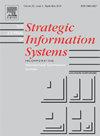人工智能与环境:组织的道德挑战和战略机遇
IF 11.8
2区 管理学
Q1 COMPUTER SCIENCE, INFORMATION SYSTEMS
引用次数: 0
摘要
在这篇观点文章中,我们的目标是提高信息系统(is)社区对一个具有重要战略和伦理意义的突出问题的认识并引发辩论:越来越多地使用生成式人工智能(GAI)对环境的影响。我们研究了几个具体问题,首先是GAI对自然资源和电力的大量消耗。然后,我们将评估富人和全球北方如何通过GAI获利,而穷人和全球南方必须应对其不利影响。然后,我们开始评估GAI对全球南方代表性不足的社区和国家的影响;虽然GAI加剧了全球变暖,但它对人们的影响并不均衡,因为主要是富人和全球北方密集使用这些技术。在提出需要更多的地方和全球法律来规范人工智能的可持续使用之后,我们报告了组织如何执行人工智能战略,例如控制智能城市的排放和改善天气预报。最后,我们提出了一个研究议程,旨在鼓励IS学者关注人工智能对环境的影响、其对组织的伦理影响,以及如何战略性地利用人工智能造福所有人。本文章由计算机程序翻译,如有差异,请以英文原文为准。
Artificial intelligence and the environment: ethical challenges and strategic opportunities for organizations
In this viewpoint article, our goal is to raise awareness and spark debate in the Information Systems (IS) community regarding a prominent concern that has important strategic and ethical implications: the environmental impact of the increasing use of generative artificial intelligence (GAI). We examine several specific issues, beginning with GAI’s heavy consumption of natural resources and electricity. We then move to assessing how the rich and the Global North gain via GAI, while the poor and the Global South must deal with its adverse effects. We then move to assessing GAI’s impact on underrepresented communities and countries in the Global South; while GAI contributes to global warming, this affects people unevenly, because it is mostly rich people and the Global North that make intensive use of these technologies. After suggesting that more local and global laws are needed to regulate the sustainable use of AI, we report on how organizations can perform AI strategizing, for instance to control emissions in smart cities and improve weather forecasting. We conclude with a research agenda that aims to encourage IS scholars to focus on the environmental impact of AI, its ethical implications for organizations, and how GAI can be used strategically to benefit all.
求助全文
通过发布文献求助,成功后即可免费获取论文全文。
去求助
来源期刊

Journal of Strategic Information Systems
工程技术-计算机:信息系统
CiteScore
17.40
自引率
4.30%
发文量
19
审稿时长
>12 weeks
期刊介绍:
The Journal of Strategic Information Systems focuses on the strategic management, business and organizational issues associated with the introduction and utilization of information systems, and considers these issues in a global context. The emphasis is on the incorporation of IT into organizations'' strategic thinking, strategy alignment, organizational arrangements and management of change issues.
 求助内容:
求助内容: 应助结果提醒方式:
应助结果提醒方式:


